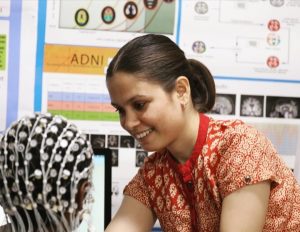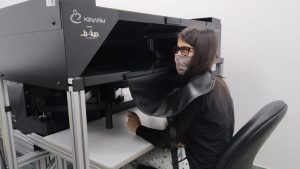Research Themes
The department offers a wide variety of research opportunities under the themes of research

The department offers a wide variety of research opportunities under the themes of research
Computational Cognitive Science, Brain-Computer Interface, Human-Computer Interaction, Development of Neuroimaging Tools, Early Detection of Alzheimers Disease, Affective Computing, Human-computer Interaction

Research in this theme uses artificial intelligence and machine learning techniques for early disease diagnosis and understanding cognitive processes. Specifically, machine learning approaches are used on MRI images for early detection of Alzheimer’s disease, emotional classification and to develop adaptive techniques for Autism and Stroke rehabilitation.
Visual Attention, Attention Capture, Tactile Perception, Multisensory integration, Haptic perception, Artificial touch

Research in this domain explores topics in visual and touch perception, particularly the role of attention and verbal labels. In visual attention, recent studies have focused on the effects of body and action in the selection and on its temporal limits. Within tactile perception, a key theme has been on understanding how higher-level processes like language, emotion, body image interact with the low-level representations of external tactile stimuli. Experiments aimed at understanding how the visual, tactile, auditory and proprioceptive senses interact are also underway.
Linguistics, Syntax and Semantics

Language is an extremely complex tool that we use to communicate in our daily lives, however, underlying mechanisms that are at play during linguistic communication need greater clarity. By understanding the nature of human minds and investigating language and communication, we explore the processes involved in linguistics, syntax, semantics and communication.
Motor Control and Learning, Brain Lateralization, Stroke, Wearable and Rehabilitation Robotics

We investigate the principles and brain mechanisms that mediate the control of our actions and probe how this control breaks down in case of brain damage. This provides insight into the functional effects and residual motor capacity following neurological disorders such as Stroke and Parkinson’s disease. This knowledge informs the development of novel human-centred robotic technologies to improve the quality of actions and human life. A key area of work is the development of wearable and cable-driven robotic systems to enable desired physical human-robot interaction.
Statistical learning, computational modeling (reinforcement learning, Bayesian approaches), cognitive processes

Consumer behaviour research is centred around decision making and approaches in behavioural economics. Current research uses computational modelling with Bayesian methods to help understand and predict consumer choice through techniques such as EEG and eye-tracking. This research contributes to the knowledge of human decision making and gives companies valuable insight into improving their services and catering to their clients.
Phenomenology, Embodied Cognition, Personality, Curiosity, Social Cognition, Moral Cognition

Research under this theme explores first person experiences involving bodily reflection, introspection and proprioception. The major focus in phenomenology has been experiential reflections on the body & mind. Similar relationships with the body and mind are explored under embodied cognition that holds the view that interactions with the body and its physical environment leads to cognitive development. Curiosity is the motivation to acquire information, with focus on its links with interest, emotion, and attention, and its implications for pedagogy.